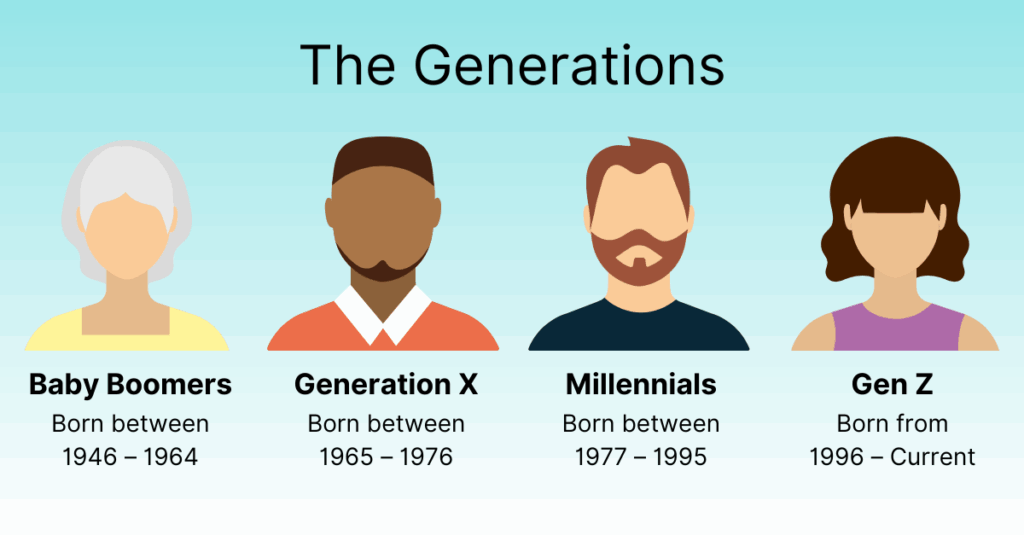
Decoding the Generations: A Comprehensive Guide to Generation Names
Understanding the nuances of different generations is crucial in today’s interconnected world. From marketing strategies to workplace dynamics, the impact of generation names and the characteristics they represent is undeniable. This article delves into the fascinating world of generation names, exploring their origins, defining traits, and societal influence. We aim to provide a comprehensive overview, enabling you to navigate generational differences with greater understanding and insight.
The Significance of Generation Names
Generation names are more than just labels; they encapsulate shared experiences, historical events, and cultural shifts that shape the values and behaviors of individuals within a specific cohort. These names provide a framework for understanding how different generations perceive the world and interact with each other. Recognizing these differences is essential for effective communication, collaboration, and societal progress.
The concept of assigning generation names gained prominence in the 20th century as sociologists and historians sought to categorize and analyze the impact of rapid social and technological changes. Each generation is typically defined by a range of birth years, although these ranges can vary slightly depending on the source and the specific focus of the analysis.
A Historical Overview of Generation Names
The Greatest Generation (Born 1901-1927)
Often referred to as the “Greatest Generation,” this cohort lived through the Great Depression and World War II. Their defining characteristics include a strong work ethic, resilience, and a sense of duty to their country. They are known for their frugality, patriotism, and commitment to building a better future for subsequent generations.
The Silent Generation (Born 1928-1945)
Coming of age in the post-war era, the Silent Generation experienced a period of relative peace and prosperity. They are often described as cautious, disciplined, and conformist. This generation valued stability and security, and they played a significant role in shaping the social and economic landscape of the mid-20th century.
The Baby Boomers (Born 1946-1964)
The Baby Boomers, a large and influential generation, were born during a period of increased birth rates following World War II. They witnessed significant social and political upheaval, including the Civil Rights Movement, the Vietnam War, and the rise of counterculture. Baby Boomers are known for their optimism, idealism, and their impact on popular culture. [See also: Baby Boomer Retirement Trends]
Generation X (Born 1965-1980)
Generation X, often characterized as independent and resourceful, came of age during a time of economic uncertainty and rapid technological advancements. They are known for their skepticism, adaptability, and their embrace of technology. Gen Xers value work-life balance and are often described as entrepreneurial and self-reliant. The generation names given often reflect societal anxieties of the time.
Millennials (Born 1981-1996)
Millennials, also known as Generation Y, grew up in a digital age and are highly connected through technology. They are known for their optimism, ambition, and their desire for meaningful work. Millennials value diversity, social responsibility, and experiences over material possessions. Their generation names are frequently debated and discussed in media outlets. [See also: Millennial Financial Habits]
Generation Z (Born 1997-2012)
Generation Z, the first generation to have grown up entirely in the digital age, are tech-savvy, entrepreneurial, and socially conscious. They are known for their pragmatism, adaptability, and their focus on creating a more inclusive and sustainable world. Gen Zers are highly engaged in social media and are often described as digital natives. Understanding generation names is key to understanding Gen Z.
Generation Alpha (Born 2013-2025)
Generation Alpha, the youngest generation, are being raised in a world shaped by technology and globalization. While their characteristics are still evolving, they are expected to be highly educated, technologically advanced, and globally connected. Their experiences will be shaped by ongoing technological advancements and global challenges. The term generation names will likely evolve as they mature.
The Impact of Generation Names on Society
Generation names have a significant impact on various aspects of society, including:
- Marketing and Advertising: Understanding generational differences is crucial for developing effective marketing strategies that resonate with specific target audiences.
- Workplace Dynamics: Recognizing generational values and preferences can improve communication, collaboration, and employee engagement in the workplace.
- Education: Tailoring educational approaches to meet the needs of different generations can enhance learning outcomes and prepare students for future success.
- Politics: Generational voting patterns and political views can influence election outcomes and shape public policy.
- Technology Adoption: Different generations adopt and utilize technology in varying ways, impacting technological innovation and adoption rates.
Criticisms and Limitations of Generation Names
While generation names provide a useful framework for understanding societal trends, it’s important to acknowledge their limitations:
- Generalizations: Generational labels can lead to generalizations and stereotypes that may not accurately reflect the experiences of all individuals within a particular cohort.
- Overlapping Characteristics: Individuals may exhibit characteristics of multiple generations, blurring the lines between generational categories.
- Cultural Variations: Generational definitions and characteristics may vary across different cultures and geographical regions.
- Arbitrary Boundaries: The birth year ranges used to define generations are somewhat arbitrary and may not perfectly capture the nuances of historical and social changes.
The Future of Generation Names
As society continues to evolve, the concept of generation names will likely adapt and change. Future generations may be defined by different criteria, such as technological advancements, global events, or social movements. It’s important to remain open to new perspectives and to avoid relying solely on outdated generational stereotypes. The study of generation names helps us understand societal shifts.
Conclusion
Understanding generation names is essential for navigating the complexities of modern society. By recognizing the shared experiences, values, and characteristics of different generations, we can foster greater understanding, communication, and collaboration. While it’s important to avoid generalizations and to acknowledge the limitations of generational labels, the study of generation names provides valuable insights into the ever-changing dynamics of our world. The influence of generation names extends across various aspects of life. Further research into generation names will continue to shape our understanding of society.
